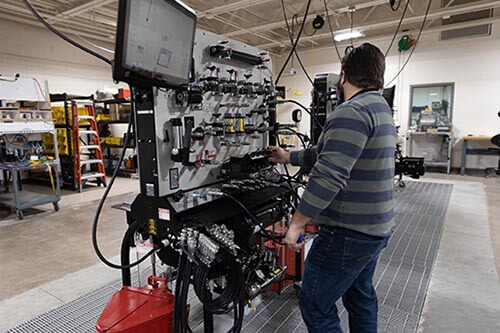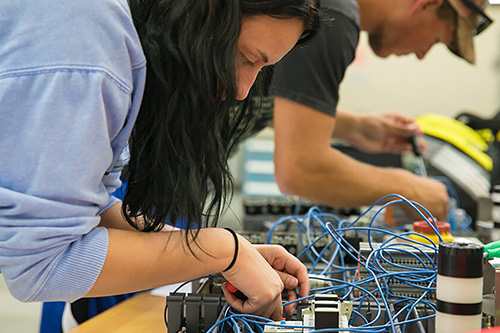Program Costs & Financial Aid
See costs of tuition, books, and supplies.Contact an NWTC support representative to find the best way to pay for this program.
Estimates based on in-state residency. Learn more about tuition and fees.
Explore Locations
How do I get started in this program?
Requirements for Certificate Entry
- Apply at www.nwtc.edu/apply.
- Submit high school, GED, or HSED transcripts and college transcripts (if applicable) to transcripts@nwtc.edu
- If your cumulative GPA is below 2.6, complete or submit a placement evaluation. Tip! Our admission advisors will assist you through every step. Have questions? Connect with NWTC Admissions at start@nwtc.edu or 920-498-5444.
- Completion of one of the following:
- 1.Clinical or Biomedical Engineering Bachelor’s Degree
- 2.Biomedical Electronics Associate Degree or equivalent military training
- 3.Electro-Mechanical Technology Associate Degree
- 4.Electrical Engineering Technology Associate Degree
- 5.Radiography Associates Degree plus the following: Introduction to AC/DC, AC 2: Reactance, AC 3: RLC Circuits, Automation 1: Control Logic, Automation 2: Motor Control, Digital 1: Logic, Digital 2: Sequential, Digital 3: Registers, Electronics 1: Diodes Basic, Electronics 2: Transistor Basic, Electronics 3: Operational Amplifier Basic.
- 6.Automation Engineering Technology Associate Degree
- 7.Be currently enrolled and completed at least 3 semesters of the one of the following programs: Biomedical Electronics, Electrical Engineering Technology, Electro-Mechanical Technology, Automation Engineering Technology.
What are my courses?
Curriculum
The Biomedical X-Ray Service Technician Advanced Technical Certificate would build upon skills gained in the Biomedical Electronics Technology AAS. Many biomed technicians would be able to advance into imaging specializations with the training we are recommending in this Advanced Technical Certificate. This certificate will cover the competencies required to service X-Ray equipment and provide foundational training on digital radiography services. These competencies include safety requirements for servicing X-Ray imaging equipment, how to read an X-Ray and diagnose root cause for poor image quality, and measuring the X-Ray tube performance. This certificate would also provide the skills necessary for other electro-mechanical technicians who may need to maintain X-Ray equipment in other environments such as airports, dentist offices, and welding inspection services.
First Semester
8 Week 1
8 Week 2
Second Semester
8 Week 1
8 Week 2
Third Semester
8 Week 1
8 Week 2
- Curriculum Note: Students must earn a "C" or higher in X-Ray Tube Operations, Fundamentals of Imaging Equipment, Image Detector Technology and Its Management, Foundations of Image Quality, and Advanced Imaging Modality Concepts.
Program Outcomes
- Utilize effective communication strategies to determine issues/problems with medical imaging systems to achieve problem resolution and client satisfaction
- Practice appropriate radiation and equipment safety in the process of resolving equipment issues
- Evaluate images and imaging equipment functionality to facilitate troubleshooting and problem resolution utilizing a network of resources
- Diagnose problematic medical system concerns through the application of appropriate testing tools and methodologies with appropriate documentation
- Develop a repair plan following problem diagnosis
- Demonstrate troubleshooting techniques on medical imaging equipment
Certificate Outcomes
- This certificate will allow technically skilled individuals to gain entry level imaging equipment repair skills.

